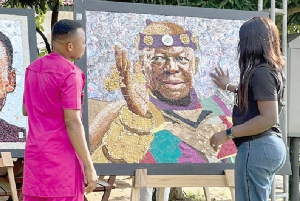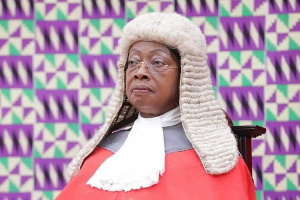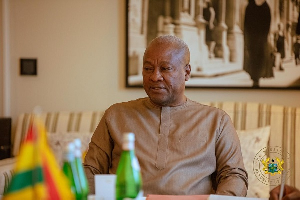A mosaic and collage artist, Eric Kwadwo Afranie, is calling on local artists to embrace sustainable practices by creating eco-friendly artworks that celebrate local culture and craftsmanship.
He said the increasing demand for upcycled art presents a unique opportunity for artists to position themselves within the expanding global market for environmentally conscious creations.
"The shift toward sustainability is not just a trend, but a long-term movement that artists should embrace. The demand for upcycled art is growing, and this presents a significant opportunity for artists who are committed to sustainability.
We need to position ourselves to meet this demand and make a positive impact on society and the environment," he said.
The call comes at a time when environmental consciousness and consumer demand for eco-friendly products are reshaping industries worldwide, including the art sector.
Afranie was speaking in an interview on the sidelines of an event dubbed ‘Ride with Team Europe’ on the theme “Promoting a Sustainable Culture through Cycling, Fashion and Arts” in Accra at the weekend.
Organised by the European Union in Ghana, the event commenced at 6am at Independence Square, with participants cycling to Alliance Française, where activities included a sustainable fashion show, a food market with eco-friendly offerings, and art exhibitions.
6 am
Afranie showcased some of his artworks made from upcycled materials such as stones, glass, plastics, recycled leather, metal, beads, wood, seashells, bones, used clothes (locally called "obroni waawu"), African prints, lorry tires, and palm kernel shells.
He commended the EU for its laudable initiative which presents new opportunities for artists committed to making a positive societal and environmental impact.
“As more individuals and organisations, like the European Union in Ghana, champion sustainability through education and collaboration, the market for eco-friendly art will only continue to grow,” he added.
He proposed that government should develop policies that encourage the circular economy within the creative industry to promote the reuse and recycling of materials.
He said, this measure, if implemented, would significantly reduce waste in the art sector while projecting Ghana as a hub for sustainable creativity.
“Artists, studios, and galleries could be incentivised to incorporate closed-loop production systems that minimise waste and maximise resource efficiency,” he said.
Afranie added that government must establish dedicated art recycling centers to encourage the use of recycled and upcycled materials.
These centers, he said would provide artists and galleries with access to studios, reclaimed wood, metal, plastics, and other materials that could be repurposed for art projects.
Entertainment of Monday, 21 October 2024
Source: Eric Kwadwo Afranie, Contributor

















